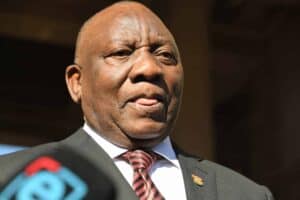Footage shows the aftermath of the February attack, with at least a dozen bodies strewn on the floor of the Altakwa mosque.

Civilians hiding in a mosque in the Central African Republic thought they would be safe. But uniformed troops, hunting rebel groups, accompanied by men believed to be Russian mercenaries, randomly opened fire on them.
Footage obtained by Washington DC-based investigative team, The Sentry, shows the aftermath of the February attack in the town of Bambari. At least a dozen bodies were strewn on the floor of the Altakwa mosque, including a woman and child.
The months-long investigation, in which The Sentry partnered with CNN, spoke to dozens of witnesses, who said they were targeted indiscriminately as fighting gripped the country.
The Central African Republic has seen waves of bloody conflict since 2012.
In March 2013, it also became the site of South Africa’s worst military defeat outside the country, with 13 soldiers killed when rebels staged a coup in the capital, Bangui.
Since then, a United Nations mission and several peace accords have failed to bring stability.
The latest wave of violence surged after a disputed election in December.
Civilians say they were caught in the violence as troops tried to take back key towns from rebel groups.
In another incident recorded by The Sentry, Russian mercenaries allegedly fired indiscriminately from a helicopter flying over Bambari. One woman said her 15-year-old son was killed, and when her husband went to look for the teen, he was killed too.
“It was the Russians who killed my husband, leaving me with children and pain,” said the woman, whose identity was hidden, in footage shared with CNN.
Private military
The Russian mercenaries are reportedly employed by a network of private security companies, known as the Wagner Group.
The private security company operates in several countries and are hired to protect assets, such as mining, ports and other valuable infrastructure.
One of the poorest and underdeveloped countries in the world, the Central African Republic is rich in diamonds, gold, copper, timber and other mineral and natural resources.
While the company operates as a private entity, a report by the Centre for Strategic and International Studies shows that their activities are often intertwined with that of the Russian military, and help to exert Russian influence.
Russia has not formally sent troops to the Central African Republic, except for about a dozen supporting the peacekeeping force. Russian fighters are known to have trained some of the troops of the Central African Republic (CAR), including running a base from the palace of the late dictator, Jean-Bédel Bokassa.
“The mercenaries deployed in Bangui and in the countryside are always referred to as ‘Russian specialists’ or ‘Russian instructors’ by CAR officials and Russian diplomats,” The Sentry told News24.
“They don’t wear any badges or identifying numbers and their faces are masked. The vehicles used by these mercenaries have no identification of their belonging to the Russian army. The presence among them of Russian active military is more than likely, but if so they do not wear uniforms and aren’t officially acknowledged.”
The men working for the Wagner Group may also be citizens of former Soviet states. Some are Syrian mercenaries, where Wagner also operates from, said The Sentry.
There were no South Africans among the group, though, likely due to language, and the fact that South African mercenaries are more expensive.
Little consequences
“These mercenaries face very few consequences, as the Russian government doesn’t recognise the existence of Russian mercenaries, and denies the participation of these ‘instructors’ in combat,” said The Sentry.
The Central African Republic’s government, which has little control outside of Bangui, also turned a blind eye in favour of Russian assistance. The Sentry said the Central African Republic’s government dismissed their investigation as a “conspiracy” of Western media. CNN was not allowed to enter the country.
“The UN mission is documenting some of the abuses, but their means of action are limited since Russia is a permanent member of the UN Security Council and, of course, they are deployed in CAR at the request of the CAR government,” said The Sentry’s team.
The United Nations Multidimensional Integrated Stabilisation Mission in the Central African Republic, or Minusca, has not yet responded to a request for comment.
News24 contacted Russian representatives in South Africa and are awaiting comment.
A 2018 report from the United Nations’ Working Group, on the use of mercenaries, warned that the “outsourcing” of military functions meant there was little oversight in conflicts, leading to human rights violations and a fear of war crimes. The News 24 Africa Desk is supported by the Hanns Seidel Foundation. The stories produced through the Africa Desk and the opinions and statements that may be contained herein do not reflect those of Hanns Seidel Foundation.






